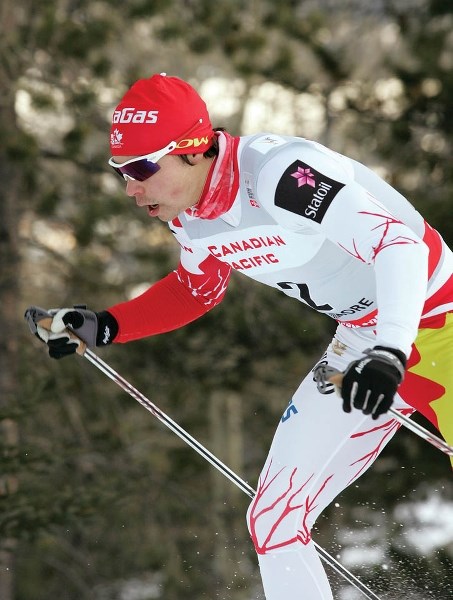The sight compelled neophyte cross-country ski racer Jess Cockney to unleash a primal scream that echoed through the packed Canmore Nordic Centre stadium at the Alberta World Cup, Saturday (Dec. 15).
Up on a massive video screen, the relative unknown on the international scene saw his name, his time and that he was ranked second in the World Cup sprint qualifier. Only Emil Joensson of Sweden, the fastest sprinter in the world, had been quicker on the windy Canmore morning.
“I belong with these guys. I beat everyone except for one guy in the qualifiers, so I’d say I belong with those guys,” Cockney said.
Armed with superfast skis hand-picked by Alberta World Cup Academy sprint coach Stefan Kuhn, Cockney laid down the best race of his life, stopping the clock at 2:32.38 for a solid second place. That paved the way for a ninth-place finish in the Alberta World Cup sprint races, but more importantly, it gave him the knowledge he’s capable of much more.
“I’ve never skied this well in my life. There’s a lot more days like these to come. Right now I’m a little upset I maybe wasted a great day. It’s a really fantastic day, but I felt I almost had something special,” Cockney said.
Fuelled by adrenalin, Cockney chose to win his quarterfinal the hard way. He led from start to finish, taking the heat with a powerful performance down the stretch.
In the semi-finals, Cockney and Canadian sprint specialist Len Valjas lined up against the world’s best. The Canadians again led from the start, forcing their opponents to feel pain on the tough 37-metre climb, making the best of a tough position. He made contact with one of the Austrian skiers at the top of the final hill, got pushed to the outside and wasn’t able to fight his way back in, finishing .7 seconds behind the leader. Valjas ended up third in the semi-final heat, but it wasn’t enough to squeeze through to the final.
“I just didn’t have a good spot on the downhill. I didn’t play it well on the top of the course and lost a few positions and I was kind of sunk once I was out of position,” Cockney said. “It’s hard to be disappointed with the best race of my life, though.”
Valjas said the fast, short 1.3 kilometre course meant strategy was tough and he second-guessed his decisions, but was happy with a seventh-place finish in the first race he felt 100 per cent recovered from a broken hand.
“It’s like a roller derby out there,” Valjas said. “It’s a really wide course, but on a day like today you almost need it wider. Jesse got caught up as part of it.”
Watching both Valjas and Cockney earn spots in the semi-final was a great sign for the men’s team, which is still searching for its first medal of the season. Alex Harvey and Devon Kershaw had poor showings in the sprints, finishing 49th and 50th.
“Hopefully this is a springboard. None of the guys are happy with the start of their season,” Valjas said.
The lanky sprinter said Kershaw and Harvey haven’t found that extra gear yet, but are still recording top 20 results, which is encouraging.
“Those guys are missing their gear. Alex… I was skiing behind him and could tell he didn’t have that top, top gear. I could tell it wasn’t the Alex of last year, but it’s coming.
“It’s part of our training. To have these results is encouraging.”
Picking up the slack, the much-improved Cockney hopes to push the big names. Coach Justin Wadsworth said they’re discussing another World Cup start for Cockney, who performed well in the sprints, but still has distance potential as well. Cockney, who was born in Yellowknife, NWT, but whose family moved to Canmore when he was seven, has his eyes set on the Winter Olympics in Sochi.
“The big thing that has changed is the mental approach to the qualifier. It obviously made an enormous difference this year,” Cockney said. “My goal is to go to Sochi and have an even better day than this.”
That attitude will help inspire Canmore ski racers and hopefully more in Yellowknife.
“My dad is Inuit and I have a close relationship with my aboriginal roots. It’s something I take pride in,” Cockney said. “I hope aboriginal kids who have spare time (try skiing). We’re good, natural cross-country skiers.”




